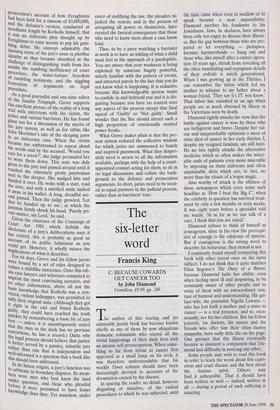The six-letter word
Francis King
C: BECAUSE COWARDS GET CANCER TOO by John Diamond Vermilion, £9.99, pp. 240 The author of this searing and yet admirably jaunty book has become known chiefly as one of those by now ubiquitous domestic columnists who record all the trivial happenings of their daily lives with an intense self-preoccupation. When some- thing so far from trivial as cancer first appeared as a small lump on his neck, it was therefore understandable that his weekly Times column should have been increasingly devoted to accounts of the devastation caused by the disease. In sparing the reader no detail, however disgusting or macabre, of the radical procedures to which he was subjected, until the time came when even to swallow or to speak became a near impossibility, Diamond ascribes his frankness to his Jewishness. Jews, he declares, have always been only too eager to discuss their illness- es. But the gap between those who are pre- pared to let everything — prolapses, hernias, haemorrhoids — hang out and those who, like myself after a cancer opera- tion 10 years ago, shrink from revealing all the often humiliating and repugnant details of their ordeals is surely generational. When I was growing up in the Thirties, I can remember the taboo which led my mother to whisper to my father about a woman friend, 'They say it's IT, you know.' That taboo has vanished in an age when people are as much obsessed by illness as the Victorians were by death.
Diamond rightly attacks the view that the battle against cancer is won by those who are belligerent and brave. Despite her val- our and unquenchable optimism a niece of mine died of cancer in her early thirties; I, despite my resigned fatalism, am still here. He no less rightly attacks the alternative medicine which so often makes the miser- able ends of patients even more miserable by imposing on them elaborate and often unpalatable diets which are, in fact, no more than the rituals of a bogus magic.
Also worthy of attack is the silliness of those newspapers which carry some such headline as 'How I beat the Big C', when the celebrity in question has survived treat- ment by only a few months or even weeks. It was eight years before a specialist told me warily, 'In as far as we can talk of a cure, I think that you are cured.'
Diamond refuses to think of himself as courageous, since in his view the prerequi- site of courage is the existence of options. But if courageous is the wrong word to describe his behaviour, then stoical is not.
I constantly found myself comparing this book with other recent ones on the same subject. I do not think that it quite matches Elisa Segrave's The Diary of a Breast, because Diamond lacks her ability, even when feeling most ill and despairing, to be constantly aware of other people and to write of them with an extraordinary mix- ture of humour and understanding. His gal- lant wife, the journalist Nigella Lawson who has lost both a mother and a sister to cancer — is a real presence, and so, occa- sionally, are his two children. But his fellow patients, his doctors, his nurses and the friends who offer him their often clumsy sympathy, have sadly little life on the page. One guesses that the illness eventually became so insistent a companion that Dia- mond had difficulty in noticing any other.
Some people may wish to read this book in order to learn the worst about this capri- cious and cruel disease and the best about the human spirit. Others may find it unbearable. That it should have been written so well — indeed, written at all — during a period of such suffering is amazing.


























































 Previous page
Previous page